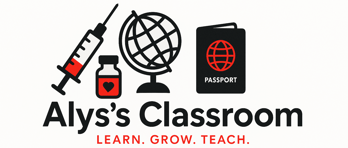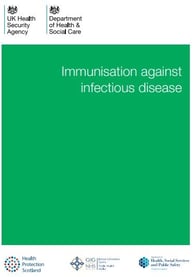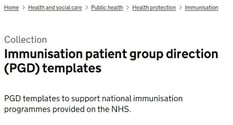Other useful links and further reading:
Varicella universal prog recommendations Nov 2023
Useful extra reading and comparison with US and UK approaches to varicella vaccination programmes. Should UK children be vaccinated against chickenpox? Interesting article
Chickenpox vaccine FAQs - NHS
Chickenpox: public health management and guidance
Guidance: Post exposure prophylaxis for chickenpox and shingles
Recent Updates & News
7th April 2025: The chickenpox public health management guidance has been updated today to reflect changes to health protection regulations.
28th Feb 2025: From GP contract 25/26:
Varicella introduction and catch-up (subject to final policy decision) effective from 1st Jan 2026: Children turning 12 months on or after 01 January 2026 will receive two doses of MMRV (at 12 and 18 months). Children turning 18 months on or after 01 January 2026 will receive one dose of MMRV (to complete their two-dose MMR schedule). Children aged 18 months to 3 years 4 months on 01 January 2026 will receive one dose of MMRV instead of their 2nd MMR dose. Of this cohort: those aged 18 months to 2 years 6 months will be invited to a brought forward appointment for their 2nd MMR dose (as MMRV) between 1 January 2026 and 31 October 2026. Those aged 2 years 7 months to 3 years 4 months on 1 January 2026 will receive their 2nd MMR dose (as MMRV) at their existing scheduled 3 years 4 months appointment before 31 October 2026. Children aged 3 years 4 months to less than 6 years will be invited for a universal single catch-up dose of MMRV. Appointments to be scheduled from 1 January 2026 and completed by 31 March 2027. Children aged 6 years to less than 11 years will be invited to receive a single dose of MMRV if they have no history of chicken pox. Appointments to be scheduled from 1 January 2026 and completed by 31 March 2027. From 1 April 2027, an opportunistic or on request offer will remain for varicella (as a single dose of MMRV) to all children aged 3 years 4 months to less than 11 years before 1 January 2026 who have no history of chicken pox.
The second update in 2 months to the Varicella Green Book chapter was published on the last day of September 2024. This change was following the withdrawal of VZIG, including use of iv Varitect CP for Group 1 neonates at highest risk of severe varicella.
NOV 2023 Chickenpox programme on the way? See JCVI notes for further info. Suggestions include a childhood varicella vaccine to be offered in 2 doses, at 12 and 18 months of age with a catch up programme for older children Read all about it in the JCVI notes.
Bits and bobs to casually drop into conversation
Did you know....
Chickenpox is most common in children and is usually mild (although not always- it can be VERY serious in some). When adults get it, however, they can get really really unwell.
Some people have been known to have 500 spots!!! (at the time of writing my mate's kid has a spot on his eyeball!)
Chickenpox is VERY contagious. There is a 90% chance you will catch it from someone who has it if you have not had it before.
Getting chickenpox once generally means someone will not get it again. However, in rare cases, it can strike more than once in the same person.
Chickenpox cases were significantly reduced during the pandemic lockdowns, meaning there is currently a larger pool of children than usual without immunity. Could this be part of the consideration to introduce a vaccine programme?
Chickenpox is a seasonal disease. Most cases occur in winter and spring. There is often a peak between March and May.












